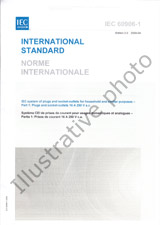We need your consent to use the individual data so that you can see information about your interests, among other things. Click "OK" to give your consent.

IEC/TR 63079-ed.1.2+Amd.1+Amd.2-CSV
Code of practice for hearing-loop systems (HLS)
Translate name
STANDARD published on 1.4.2020
The information about the standard:
Designation standards: IEC/TR 63079-ed.1.2+Amd.1+Amd.2-CSV
Publication date standards: 1.4.2020
SKU: NS-1091997
The number of pages: 221
Approximate weight : 694 g (1.53 lbs)
Country: International technical standard
Category: Technical standards IEC
The category - similar standards:
Annotation of standard text IEC/TR 63079-ed.1.2+Amd.1+Amd.2-CSV :
IEC TR 63079:2017+A1:2018+A2:2020 gives recommendations for and guidance on the design, planning, installation, testing, operation and maintenance of a hearing-loop system (HLS) intended for communicating speech, music and/or other signals. It is mainly concerned with HLS for hearing enhancement, in which the signals are communicated to users of hearing aids equipped with magnetic pick-up coils. This document does not apply to induction-loop systems which use a carrier frequency, nor to other systems for hearing enhancement purposes which do not use magnetic induction. This consolidated version consists of the first edition (2017), its amendment 1 (2018) and its amendment 2 (2020). Therefore, no need to order amendments in addition to this publication.
We recommend:
Technical standards updating
Do you want to make sure you use only the valid technical standards?
We can offer you a solution which will provide you a monthly overview concerning the updating of standards which you use.
Would you like to know more? Look at this page.



 Cookies
Cookies
